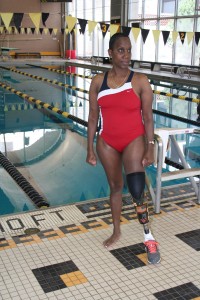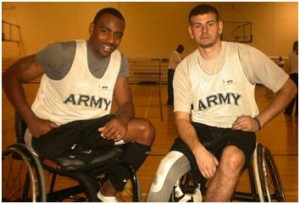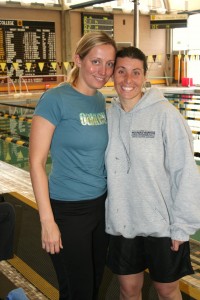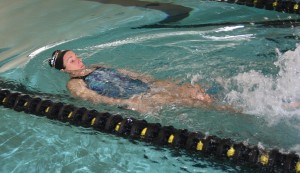By SSG Emily Anderson, WTC Stratcom
CPL Harrison Ruzicka was told he signed up for the 2011 Warrior Games two months too late, but fate stepped in a month later when another Soldier had to drop out of the competition. Ruzicka, currently assigned to the Walter Reed Army Medical Center (WRAMC) Warrior Transition Unit, was given the opportunity to go for gold in the 50-meter men’s freestyle swimming event.
For Ruzicka, the swimming competition adds extra pressure, not because of his injuries, but because every time he dives into the water the memory of his accident flashes into his mind.
Ruzicka, who qualified for the swimming finals, was injured August 7, 2009, when an improvised explosive device (IED) hit his vehicle while he was deployed to Afghanistan. Due to the IED, he was trapped under his vehicle in a river. He eventually lost his right leg and had pins haloed around his left leg to keep the bones intact.
“Training and competing is about 200 percent more mental than physical for me,” said Ruzicka. “I used to dive growing up, but since the accident, it’s been harder.”
“I have to focus on controlling my heart rate before I dive into the water, and I still can’t wear dark goggles when I dive,” he added. “This time last year I was still healing, so I’m just happy to be here.”
CSM Jesus Febo-Colon, the WRAMC Warrior Transition Brigade Command Sergeant Major, has been very supportive of the Army swim team by attending all of the training sessions and the preliminaries where he has Ruzicka and six other Soldiers assigned to the WRAMC Warrior Transition Unit competing in the swimming events.
“It’s a priceless personal experience to see our boys and girls working so hard to prove that there is no misfortune that doesn’t bring some good with it,” Febo-Colon said. “In spite of all their losses, their souls are full of hope; their hearts are overflowing with positive emotions; and there is only one thought going through their minds—I can.”
During the swimming preliminaries, the Army’s team took to the water with an agenda of not letting any other branch excel in this event.
That goal was achieved. After the long training hours and the extra practices to make sure they were ready, the Army’s team had 15 Soldiers qualify for the finals.
SGT Angel Herrera
MSG Rhoden Galloway
SSG Kenny Griffith
SPC Michael Grover
SPC Andy Kingsley
SSG Robert Laux
SSG Stefanie Mason
SPC Evan Marcy
CPT Elizabeth Merwin
SPC Jasmine Perry
SFC Landon Ranker
CPL Harrison Ruzicka
SPC Galen Ryan
SGT Gavin Sibayan
SGT Matthew Sullivan
“I definitely think we are the top dog of today’s events,” Febo-Colon said after the preliminaries were over and the results were announced.
Congratulations to the finalists! Everyone did a great job and I look forward to seeing the team give it their all at the finals.












